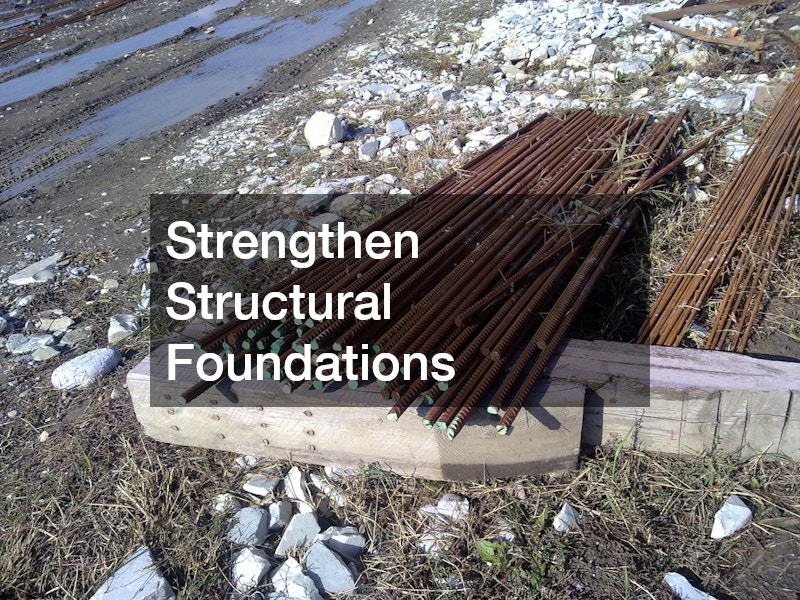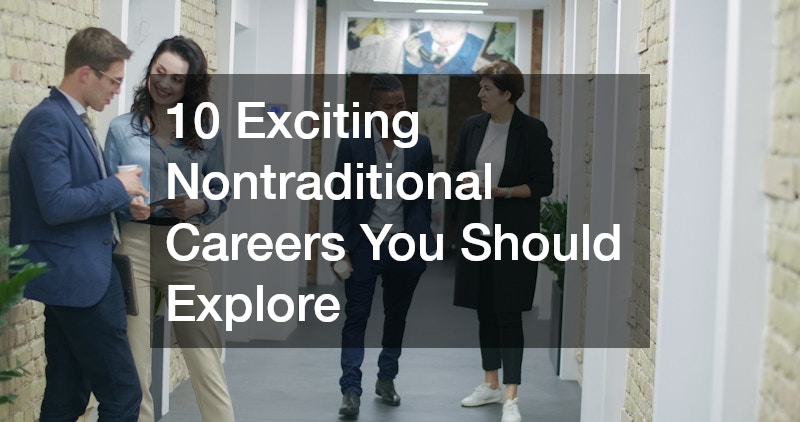10 Exciting Nontraditional Careers You Should Explore
In the dynamic landscape of today’s workforce, nontraditional careers are paving the way for many individuals to thrive in diverse industries. As opportunities evolve, many are choosing paths that were previously viewed through the lens of gender stereotypes or educational prerequisites. While traditional roles offer security, it is the nontraditional careers that are often filled with innovation and expansion potential, providing avenues for growth that are both rewarding and fulfilling. These roles are becoming increasingly prominent across various fields such as construction, transportation, marine stability, manufacturing, and more. For instance, roles in steel fabrications and powder coating companies are no longer confined to the typical workforce stereotype, opening doors to people from all walks of life. By embracing nontraditional careers, individuals can not only diversify their skill sets but also contribute to the shaping of industries that drive the economy and society forward. This article will delve into various sectors where nontraditional careers are making significant impacts, highlighting key industries where these opportunities are emerging and evolving. Join us as we explore how nontraditional roles are influencing construction, transportation, marine operations, precision tools, product durability, protective finishes, structural integrity, underground utilities exploration, cold-climate engineering, and maritime manufacturing. Through this exploration, we hope to illuminate not only the potential for professional success but also the contribution these careers make to society at large, encouraging more individuals to consider and pursue paths that break the conventional mold.
1. Shape the Future of Construction

The architecture and operation of modern cities are continuously evolving, thanks in large part to innovative construction practices. Among these, steel fabrications play a pivotal role in the creation of durable and modern structures. This sector has seen increased participation from nontraditional careers, with individuals who bring diverse skills and perspectives contributing to more balanced and efficient project outcomes. Steel fabrications are essential in designing buildings that are not only strong but also sustainable. The demand for sustainability has led to a shift in how construction projects are approached, drawing professionals from various educational backgrounds and experiences into nontraditional roles. Women, for instance, are increasingly found participating in what were once male-dominated fields, offering innovative solutions that incorporate both environmental considerations and inclusive design principles. As steel fabrications become more integral to construction efforts, nontraditional careers in this field are gaining traction. The collaborative efforts of engineers, architects, and fabricators ensure that each project is both innovative and feasible. By stepping into these nontraditional roles, individuals can help shape the future of construction, pushing boundaries and redefining what is possible in building design and execution.
2. Keep Transit Systems Moving
The backbone of modern urban life is the ability to move people efficiently and safely from one point to another. Track maintenance services play a critical role in ensuring that transit systems operate smoothly. This sector has seen a rise in nontraditional careers, where diverse skill sets are becoming increasingly valuable in maintaining our infrastructure. These services go beyond simple repairs and involve sophisticated engineering techniques that require fresh perspectives and varied expertise. Many who work in track maintenance have transitioned from other engineering backgrounds or have come from completely different fields, demonstrating the fluidity and adaptability of nontraditional careers. Their contributions are crucial in adapting the infrastructure to accommodate the growing population demands while ensuring safety and reliability. The integration of nontraditional careers in track maintenance services not only enhances the quality and efficiency of transit systems but also promotes a culture of innovation and inclusion. As we continue to upgrade and expand transportation networks, the need for diverse teams will only grow, offering numerous opportunities for those willing to step outside traditional career paths and embrace new challenges.
3. Improve Marine Stability
In the maritime industry, maintaining stability is crucial for the safety and efficiency of sea vessels. Seakeeper services have become an integral component in ensuring that vessels are equipped to handle the unpredictable nature of the ocean. The rise of nontraditional careers in this sector is opening opportunities for individuals to bring unique and diverse skills to the maritime field. Seakeeper services include the development and implementation of cutting-edge technology that counters the rolling effects caused by waves. This requires knowledge and expertise that spans various disciplines, making it a prime field for nontraditional careers. Individuals from different engineering backgrounds, as well as those with experience in technology and electronics, are finding rewarding roles where they can innovate and solve complex problems. By embracing nontraditional careers, the seakeeper services industry is expanding its reach and capability, providing safer and more comfortable experiences for those at sea. The exchange of diverse ideas and approaches is instrumental in advancing marine operations, setting new standards for what can be achieved both technically and creatively within the industry.
4. Power Precision Tools

In the world of manufacturing, precision is everything. An air feed drill supplier must ensure their products meet rigorous standards while developing tools that enhance process efficiency and output quality. Nontraditional careers in this niche are redefining what it means to work in precision tooling, with diverse professionals bringing innovative solutions to longstanding challenges. Traditionally dominated by a certain demographic, the precision tooling industry now embraces a multitude of backgrounds, contributing fresh perspectives and skills. Women, for example, entering engineering and technical roles, are offering groundbreaking ideas in design and automation processes. Such inclusion catalyzes advancements and improvements in manufacturing, highlighting the significance of nontraditional careers. As an air feed drill supplier, it is critical to understand and anticipate the evolving needs of the market. Nontraditional careers add value by fostering creativity and innovation, ensuring that the industry remains competitive and that products continue to evolve to meet the demands of global markets. Through this diversity, the precision tooling sector is strengthened and increasingly resilient.
5. Create Durable Products
The creation of durable products is a cornerstone of many manufacturing processes, with the sealant manufacturing company sector playing a pivotal role. Products must withstand various environmental factors, necessitating advanced materials and techniques. Here, nontraditional careers are providing new paths for innovation, bringing a wealth of knowledge and varied experience to the development of high-performance sealants. These careers often involve innovative research and the application of cutting-edge technology to achieve enhanced product durability. With complementary skills from chemistry, engineering, and materials science, individuals from nontraditional backgrounds are crucial to this field. Their interdisciplinary approach can lead to new materials that respond better to pressures, temperatures, and other external conditions. Embracing nontraditional careers within a sealant manufacturing company means embracing the potential for groundbreaking advancements in product resilience and longevity. This sector thrives on diverse input, which fuels the development of more effective and versatile products that stand to benefit industries across the board, from construction to technology.
6. Protect and Enhance Materials
The role of powder coating companies is invaluable in providing durable finishes that protect and enhance the appearance of countless products. These protective and aesthetically pleasing finishes are often developed through nontraditional careers, which introduce new ideas to these age-old processes. This infusion of diverse talents is revolutionizing how materials are treated and utilized across numerous applications. Powder coating requires expertise in chemistry and engineering, making it ripe for the inclusion of professionals from varied academic and career backgrounds. These nontraditional paths are contributing to the advancement of coating technologies, including eco-friendly and efficient alternatives that align with global sustainability goals. Individuals stepping into these roles often bring innovative solutions that help streamline processes and enhance product quality. By embracing nontraditional careers, powder coating companies can remain at the forefront of material science advancements. These careers not only lead to more effective protection and aesthetic enhancement of materials but also promote a culture of innovation and sustainability that benefits both the industry and the environment.
7. Strengthen Structural Foundations

A rebar fabrication company sits at the heart of construction, providing the essential components that lend strength to concrete structures. This area has seen a surge in nontraditional careers, contributing to the evolution of construction methods and the strengthening of buildings and infrastructure alike. The fabrication of rebar involves intricate processes that require an understanding of engineering and materials strength. Nontraditional careers in this realm are providing new insights into design strategies and fabrication methods that maximize structural integrity while conserving resources. Individuals from different disciplines bring fresh ideas that help improve efficiency and cost-effectiveness. Nontraditional careers in rebar fabrication companies not only enhance the quality and safety of construction projects but also fuel innovation and progress within the industry. By incorporating diverse talents and experiences, companies are better able to tackle complex challenges and meet the evolving needs of modern construction projects.
8. Explore Underground Utilities
The exploration and maintenance of underground utilities are becoming increasingly important as urban areas expand and densify. Hydro air excavation service providers play a crucial role in ensuring safe and effective excavation processes. This sector is particularly ripe for the inclusion of nontraditional careers, offering numerous opportunities for innovation and advanced technology application. Hydro air excavation techniques rely on precision and care, necessitating a workforce with diverse skills and expertise. Individuals from various sectors, including engineering, environmental science, and technology, are finding roles that allow them to revolutionize traditional excavation methods. Their contributions are vital for improving safety, efficiency, and environmental impact. By embracing nontraditional careers, hydro air excavation service companies can lead the way in forward-thinking excavation practices. This approach not only optimizes resource use and minimizes damage but also encourages a culture of continuous improvement and adaptation, essential for meeting the complex demands of modern utility management.
9. Engineer Winter Solutions
The challenges posed by winter conditions demand innovative engineering solutions, and snow plow blade manufacturing is at the forefront of these efforts. Nontraditional careers are critical in addressing these challenges, bringing fresh perspectives and novel approaches to product development and functionality. Snow plow blades must be designed to withstand harsh conditions, making material science and engineering critical areas for innovation. Individuals entering from nontraditional backgrounds often offer unique insights into materials and design improvements, enhancing the durability and effectiveness of these essential tools during inclement weather. Through the integration of nontraditional careers, snow plow blade manufacturing can continuously adapt and improve, ensuring that communities remain safe and operational during the toughest winter conditions. This sector exemplifies how embracing diversity in career paths not only enhances product offerings but also significantly impacts public safety and infrastructure performance.
10. Build Vessels That Move the World

The construction and manufacturing of large-scale vessels are critical to global trade and logistics, with barge manufacturers playing a pivotal role in this ecosystem. Nontraditional careers within this field are vital for integrating cutting-edge technology and techniques into shipbuilding processes. Barge manufacturers depend on a wide range of expertise, from design and engineering to logistics and environmental science. The inclusion of professionals from nontraditional career paths allows for the fusion of diverse skills and innovation strategies, ultimately enhancing vessel performance, efficiency, and sustainability. Embracing nontraditional careers enables the barge manufacturing industry to address the complex and evolving needs of global commerce. By championing diverse perspectives, this industry can craft more adaptable, durable, and eco-friendly vessels, fostering growth and sustainable practices within the maritime sector.
Nontraditional careers are proving to be the driving force behind innovation and growth across a multitude of industries, each with its own unique challenges and opportunities. Whether it’s steel fabrications or hydro air excavation services, the entrance of diverse career backgrounds is transforming how these fields operate and innovate. As individuals continue to break free from traditional career constraints, new possibilities are being unlocked, leading to enhanced productivity, sustainability, and inclusive practices within industries. The benefits of this shift are far-reaching, improving not only the industries themselves but also the societies they serve. By fostering environments that encourage varied experiences and perspectives, we are better equipped to navigate the complexities of modern challenges and build a future that stands on the shoulders of collaborative excellence. Encouraging nontraditional careers is essential in preparing industries for future demands, ensuring their adaptability and success in a rapidly changing world. The future belongs to those who are willing to explore new paths and embrace the possibilities of nontraditional careers, forging a landscape where innovation and inclusivity thrive in harmony.




Post Comment